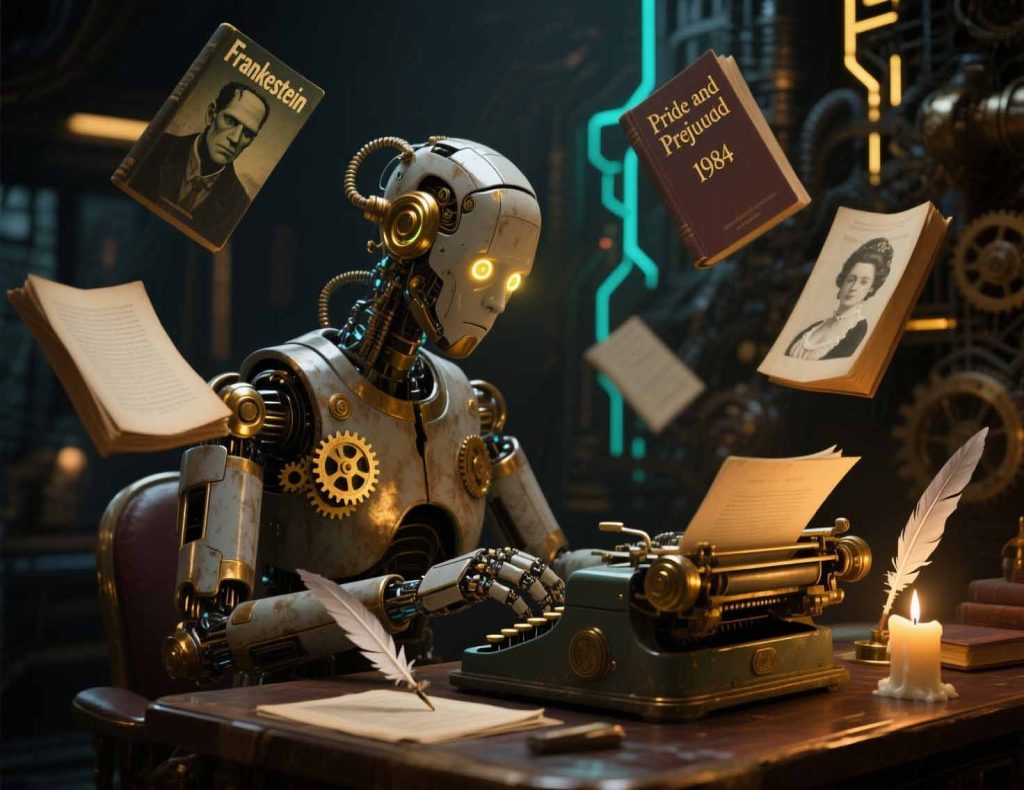You ever think about how weird it is that we tell stories at all? I mean, humans have been doing it forever—around campfires, in dusty books, on screens—and now… we’re asking robots to do it for us. Yep. Artificial intelligence is trying to become the next Shakespeare, and honestly, part of me wants to laugh, and part of me is slightly terrified.
AI storytelling is booming. There are apps that can whip up short stories, generate character names, or even “write” a novel in the style of some famous author. It’s fast. Efficient. Sometimes eerily coherent. But here’s the thing: it’s missing that messy human magic.
AI in Storytelling: What It Can Actually Do
Let’s break it down. AI can:
- Generate coherent stories based on patterns it has seen. It’s like a parrot that’s read every book in the library and tries to string words together logically.
- Suggest plots, twists, or dialogue. Stuck on a story idea? AI can spit out options faster than your coffee kicks in.
- Power interactive fiction or video games, where the story bends to your choices in real-time.
- Give writers a shove when they’re staring at a blank page, whispering, “Hey, maybe try a talking dragon?”
And that’s kind of cool, right? For a writer struggling with a deadline, it’s like having a tireless brainstorming buddy who never complains about your weird ideas.
But Here’s the Human Problem
Stories are more than words. They’re emotion, context, memory, lived experience. That’s where AI falls flat.
- It doesn’t feel. It can describe grief, joy, or terror, but it doesn’t know either.
- It can mimic Shakespeare’s iambic pentameter, but it won’t understand the heartbreak behind “To be, or not to be.”
- It lacks intuition, that tiny spark that makes a plot twist resonate in your chest or a character’s struggle hit home.
- Cultural nuance? Forget it. AI can regurgitate patterns, but it can’t understand what it’s like to live in a particular time, place, or society.
Basically, AI is impressive on paper but… soulless.
When AI Actually Helps
I don’t want to sound like I’m trashing it entirely. AI has its place.
- Stuck in a rut? AI can toss some wild ideas your way—like “a talking cactus joins a rock band.” Ridiculous? Sure. But maybe that sparks something human and original.
- Interactive storytelling in games? AI shines there, because variability and branching plots can get messy for humans to program manually.
- Drafting rough ideas or outlines? Absolutely. Save time on tedious structure stuff so you can focus on the fun, emotional parts.
The trick is: use AI like a hammer, not a brain. Let it do the heavy lifting, but keep your heart on the page.
The Pitfalls of AI Writing
There are some straight-up dangers if we rely on it too much:
- Predictability: Because AI works on patterns, a story can feel… meh. Safe. Boring. Like a reheated microwave meal of plotlines.
- Shallow emotion: You can have the words, the grammar, the tension—but without subtlety, it doesn’t move anyone.
- Voice loss: Writers might start leaning on AI too much and sound like every other bot-generated story out there.
- Ethical gray zones: Who “owns” an AI story? And at what point is it stealing from humans whose work trained it?
The Future: Humans + AI, Not Humans vs AI
Here’s the thing: the future isn’t AI taking over stories; it’s collaboration.
- AI can give prompts or suggest twists, but the human writer adds nuance, empathy, and weird imagination.
- We can experiment wildly, combining AI’s speed with our messy, unpredictable creativity.
- Think of it as a partnership: AI lays the track, humans drive the train.
Even with all the advances, AI can’t replicate heartbreak, joy, fear, or the messy quirks that make Shakespeare, Rowling, or Tolkien unforgettable. And honestly? That’s the point.
Final Thought
AI storytelling is fun, sometimes brilliant, and occasionally spooky. It can generate stories, suggest plots, or help you escape writer’s block. But it can’t live the stories it tells. It doesn’t laugh, cry, or sit awake at 2 a.m. wondering if your character really deserved that fate. That’s the human part. That’s the soul.
So yes, bots can spin tales. They can even mimic literary legends in style. But the heart—the messy, imperfect, deeply human heart—that’s ours alone. And maybe we like it that way.



